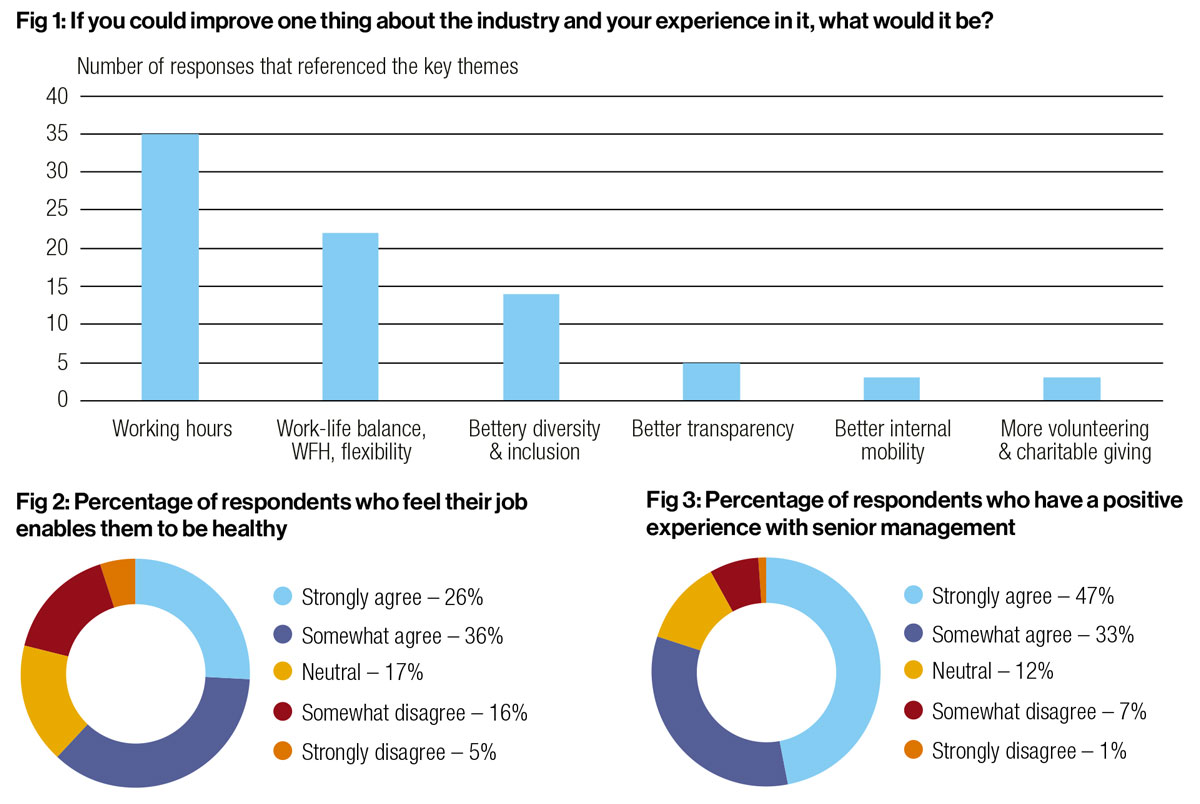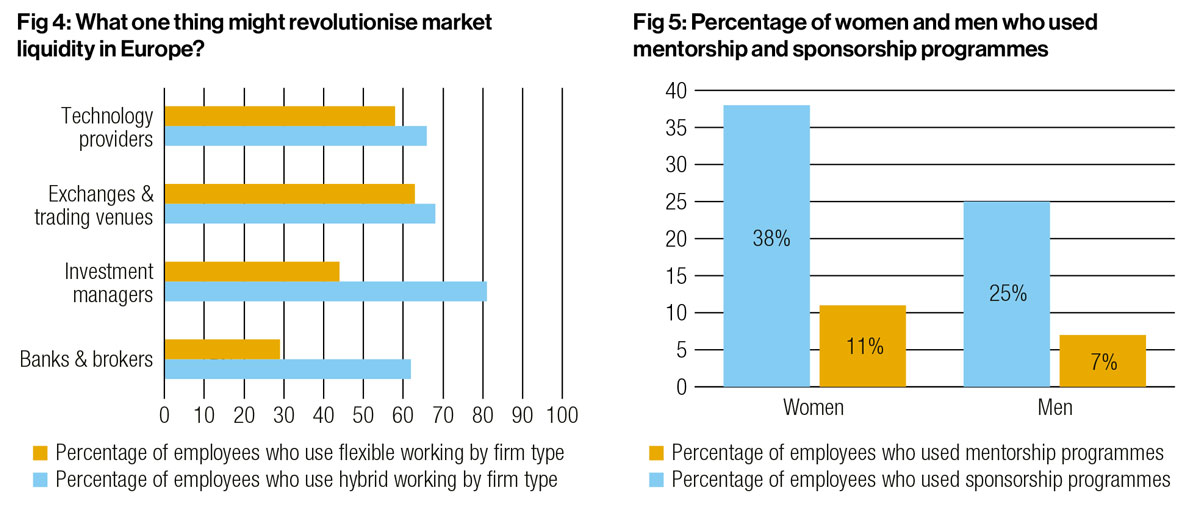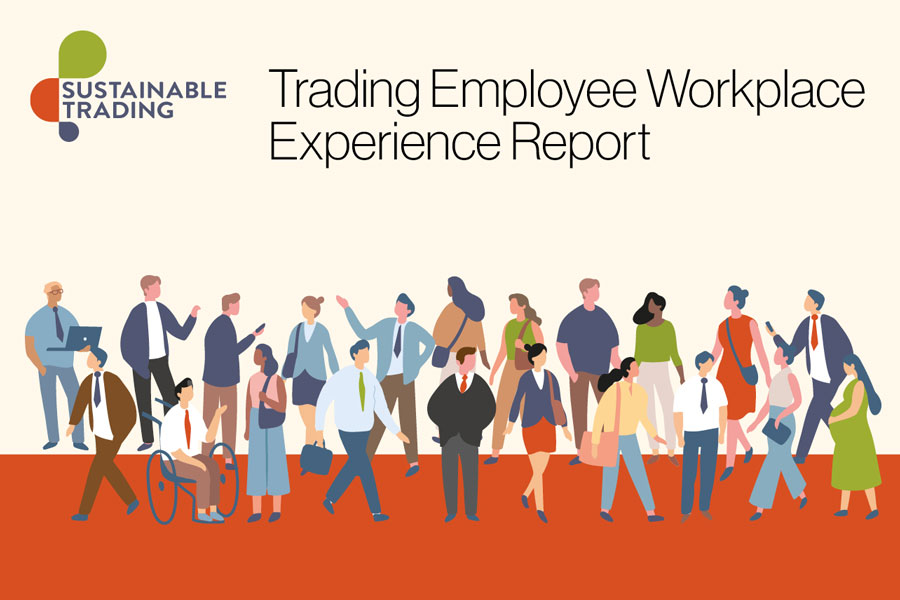The high-stakes, high-pressure nature of the global markets trading industry is well-known, but recent survey findings shed light on the changing attitudes and expectations of employees within this demanding environment. The new report from Sustainable Trading reveals deeper insights into the professional lives of trading employees – one that goes beyond the numbers and into the heart of workplace challenges.
The Trading Employee Workplace Experience Report offers a comprehensive view of the challenges faced by 273 current and former trading professionals. Responses highlighted issues from long market hours to the need for flexible work structures.
The unexpected debate: Market hours
While the demanding nature of trading is no secret, the call for reduced market hours has emerged as a consistent theme in the survey, despite not being directly asked.
In fact, 35% of employees who voluntarily commented on improvements for the industry, specifically advocated for shorter market hours. Additionally, 37% of employees who shared personal comments on their well-being, highlighted the negative impacts of long working hours on their health, family life and career longevity. As one employee put it, “I think the determining factor to staying in the industry is if my health would let me keep up with the hours and early starts.”
The voluntary and recurring feedback throughout the survey highlights a disconnect between industry practices and employee thresholds. The conversation on market hours has repeatedly surfaced, and this report has highlighted the prominence of this discussion. These results highlight a need for renewed dialogue on market and working hours, as it clearly is an important topic for employees within the trading industry.
Balancing the scales: Health and well-being
The fast-paced nature of the trading desk has been reported to take a toll on employee health. While most employees believe their job allows them to be healthy, one in every five people report that their demanding roles force them to sacrifice personal well-being. Long hours, constant screen time and limited breaks contribute to physical and mental health issues.
As one respondent noted, “I cover 2 regions so work very long days… I have less and less time to focus on my mental and physical health!” Another highlighted, “I worry that the inactivity required from being a sales trader is very bad for our health.”
The mental health impact is particularly concerning. The industry’s rigid structures and intense work often lead to heightened stress and prevent employees from prioritising self-care activities like exercise or healthcare appointments. It also negatively affects their family time and other personal commitments.
As employees balance their health with demanding job expectations, there is a pressing call for enhanced support and structural changes to better meet their needs. However, the fact that the majority of employees feel their job enables them to be healthy is a positive sign. This suggests that, despite the challenges, there are existing practices that can serve as a foundation for further improvement.

The management factor: A key to satisfaction
Management plays a crucial role in shaping workplace satisfaction. The report reveals that 80% of employees had positive experiences with senior management, thanks to their management’s openness, accessibility, responsiveness and strong communication. This is not just about being listened to – it was about being actively involved in decision-making and strategy.
One respondent noted, “Each of our all trading desk meetings start with a ‘Safety Moment’ where someone shares an experience or topic that they think we can all learn from.”
On the flip side, poor management practices – such as overworking employees, not adapting to feedback and stigmatising employee challenges – were significant sources of dissatisfaction for one in five. Management’s role is critical not only in daily operations but also in fostering an environment where employees feel valued and supported.

Flexibility: The modern solution to work-life balance
While the pandemic may have normalised hybrid and flexible work in many sectors, the push for greater flexibility in trading continues.
Although 65% of employees say they can leave their desks, many still feel constrained. While 86% have access to hybrid working – spending part of the week working from home – flexible practices remain underutilised, with only 62% able to step away for personal responsibilities. Additionally, only 2% of employees use condensed work weeks.
Interestingly, hybrid work was especially popular among larger firms, while flexible working options were more common at smaller firms.
Those with access to flexible and hybrid work arrangements report higher job satisfaction, noting that it helps them balance personal responsibilities without compromising work. As one respondent shared, “The flexibility allows me to be present for my children,” another noted, “If done correctly, it can improve productivity and longevity in the role.”
In contrast, those without flexible access express frustration over the impact on their well-being and work-life balance. Firms that resist offering flexible work policies may struggle to retain talent compared to companies or industries that offer better working conditions.
Enhancing career development: A call for greater support
Employees are seeking more structured support for career development, including mentorship and sponsorship programmes. Yet only 27% of employees participate in mentorship programmes, revealing a clear appetite for more opportunities, particularly among women and senior-level staff. Out of all female respondents 38% have participated in mentorship programmes, compared to 25% of all male respondents.
The survey also highlighted a growing demand for stronger diversity, equity and inclusion (DEI) initiatives, especially from long-term industry professionals. There are calls for improved disability inclusion, senior management development, clear career progression for young hires, mental health awareness and better gender representation.
Employee network groups are valued for promoting inclusion, yet many feel more needs to be done to address diversity gaps in the industry.
A path forward: What firms can do
The message from this report is clear: trading firms must adapt to attract and retain talent. While the industry’s intense work culture is well-known, employees are demanding changes that prioritise working hours, well-being and flexibility.
This report serves as roadmap for aligning with these evolving values, including reconsidering market hours, improving access of flexible work structures, supporting mental and physical health initiatives, and fostering a culture of open communication. Enhancing career development programmes and prioritising diversity and inclusion are crucial. Addressing these areas will boost employee satisfaction and help firms stay competitive amid a talent drain.
About this research:
This report is based on the Trading Employee Workplace Experience Survey, conducted by Sustainable Trading in Q2 2024. They survey collected 273 responses from current and former trading professionals over a ten-week period. Data was analysed thematically and demographically to provide a comprehensive view of the trading workplace. Sustainable Trading, a non-profit dedicated to improving the sustainability of the trading industry, aims to use these insights to guide industry improvements and better support the trading workforce.

